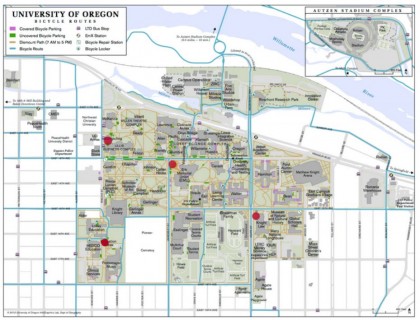With its bike parking spaces crammed and its long-term bike loan program booked solid, the University of Oregon is preparing to add a four-station bicycle sharing system on its Eugene campus.
The cities of Eugene and Bend, meanwhile, are considering municipal systems of their own.
“We really can’t meet the demand for the bikes that we have on campus,” said Briana Orr, a university staffer who manages UO’s $30-per-term bike library, which has 100 bikes in its fleet. “We’re trying to find a way to serve more students and still provide a really high-quality bike, and keep the costs low.”
It’s the latest step in the continuing spread of bicycle sharing, now available on one scale or another in 40 U.S. urban areas. Portland has secured funding commitments for its proposed 75-station system but hasn’t yet finalized contracts with its private sponsor or sponsors. Last week, the Portland Mercury reported that a spring 2014 launch seems increasingly unlikely for Portland’s system.
B-Cycle, the Wisconsin-based bikesharing vendor that provides equipment to many of the nation’s smaller bike sharing systems, has received the contract and is currently negotiating with the college, which will use $199,000 in student activity fees to install the four-station, 40-bike system.
As with other bike sharing systems, members of the public and visitors to campus will be able to use the bikes for a fee, in addition to students, faculty and staff. Orr said the university hasn’t determined yet how much the system’s users will pay for the service.
In Madison, Wisc., a B-Cycle bikesharing system charges students $20 per year for membership. Trips of 30 minutes or less are free to members, with upward-sliding fees for longer trips.
“We really see this as an extension of transit. It’s exactly what they do. They’ve got all the marketing expertise, they know where the destinations are going to be.”
— Eugene bike planner Reed Dunbar on Lane Transit District’s interest in public bike sharing
The university system was conceived as part of a larger plan to bring a citywide bikesharing system to Eugene, linking the campus with perhaps 30 or so stations around the city’s downtown commercial and residential areas.
Eugene planner Reed Dunbar said in an interview that though the city missed a federal grant last year that would have paid for such a system’s launch, the city has hired Toole Design Group to complete a feasibility study for a Eugene system, to be wrapped up in early spring.
“We’re really trying to figure out what this thing is going to look like: where our activated blocks are, where the stations would be more successful,” Dunbar said. “We know that the university is a major destination.”
Lane Transit District, Eugene’s transit system, is co-funding the feasibility study. Because the bus lines between downtown Eugene and the campus often run at capacity, a bike sharing system is seen as a possible low-cost way to improve transportation between those areas.
“We really see this as an extension of transit,” Dunbar said, saying that LTD will be a valuable partner in planning the system. “It’s exactly what they do. They’ve got all the marketing expertise, they know where the destinations are going to be. It ties in nicely with the new station developments.”
Portland-based Alta Bicycle Share, a B-Cycle competitor which operates many of the country’s larger bike sharing systems (but a few smaller ones, including a 9-station system at Washington State University in Pullman) didn’t make a pitch for the UO system.
Meanwhile, in Bend, a top parks planner signed up for a webinar last week on how to fund bike sharing systems. Last year, Bend nonprofit Commute Options launched a bike share demonstration area for its office building. Executive Director Jeff Monson said he hopes the city can find funding for a 6-10 station system.
“The city council, MPO, Parks and Rec, downtown association, they’re all interested,” he said. “I like bike share a lot. I think it’s the wave of the future.”
Orr said part of the appeal of a bike sharing system for the University of Oregon is that, with 21 percent of off-campus students arriving by bicycle, the university’s 6,000-plus bike parking spaces are full up.
“I suspect that if we can provide folks with bikes through bikeshare on campus, it’s going to alleviate some of our bike parking challenges,” she said. “Trying to figure out ways to serve more people with less space — I think that’s every university’s challenge.”








Thanks for reading.
BikePortland has served this community with independent community journalism since 2005. We rely on subscriptions from readers like you to survive. Your financial support is vital in keeping this valuable resource alive and well.
Please subscribe today to strengthen and expand our work.
Uh-oh, looks like Eugene and Bend could both get their bike share up and running before Portland
Along with Phoenix, Boise and a slew of other municipalities. Sad, really. Go America’s #1 Best Bike City, go!!
Are there any time-based penalties in the Alta contract? Or anything that says if the system isn’t up by a certain date then the contract is void?
Nope. See item 10:
http://bikeportland.org/2013/09/04/10-key-details-from-portlands-bike-share-proposal-and-contract-93341
Wow. Portland has had several issues with contracts that lacked deadlines, and they keep getting screwed each time.
I think our densest communities need to move beyond bicycle mode. We need skateboard mode.
Bike share will work some places and not others. In Portland, no proven demand, a different lay out (we are not a campus) etc. Furthermore, U of O doesn’t have the kind of equity concerns that exist in PDX. U of O won’t let part of campus deteriorate to fund bike share (the Portland model of funding).
Actually, the U of O idea sounds very smart.
How about a $200,000.00 B-cycle bike share experiment in Outer SE near the Springwater corridor? Kaiser could pick up the whole tab.
Not a terrible idea if you don’t expect bikeshare to break even on operating costs. Much better idea than the scheme to put a streetcar in outer East Portland.
Some industrial or government campuses, like national labs, have free bikes scattered around. They are usually single speed with coater brakes and a handlebar basket. It works in those locations I suppose because the campus is enclosed with a fence and security guards at the exits – so not likely to be stolen.
Not the most researched person over here, but i would imagine the operating costs of a decent sized bike share program (i.e. – 500 or more bikes available) would barely be equivalent to 1/10th the price of a medium sized city’s annual roadway upkeep or local transit subsidies/operating debt. Probably a lot less if the bikes were part of a not for profit company that accepted donations as well as benefited from tax breaks….when’s the last time you heard of auto owners donating to a street fund outside the exorbitant operating costs they already incur? Of course the actual realized return on investment would probably be more ethereal than intrinsic (more clean air, less local street ‘traffic’, happier & more involved citizens) – but without something tangible like MAX bridges or fresh asphalt, the average person views bike share as just a novelty – and probably the main reason it’s taken so long for Portland to implement…it’s just not considered as serious an issue as CRC seems to be for most media outlets to dedicate themselves to. Thanks BikePortland for the great write-up, yet again.
a bikeshare system implemented with BitLock (http://bitlock.co) costs 10X less than station-based systems. University of Oregon should considering using this system instead. This way they can use the same existing bikes in their library.